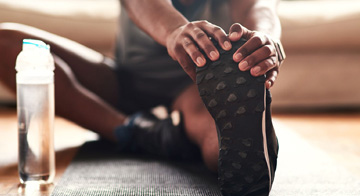The internet continues to transform our daily lives, and revolutionise the way we communicate, learn, work, and access information.
From a health perspective, it has never been easier to access expert medical advice, connect with online healthcare providers and find valuable health resources and support groups. This can allow us a better understanding of our health conditions and provide a sense of connection and validation for those of us who may be struggling.
However, as well as the many benefits, it's also important to recognise the potential negative impact the internet can have on our mental health.
In this article, we will look at the impact of the internet, with a particular focus on men's mental health, exploring both the positive and negative effects. We'll also provide expert tips on how to maintain healthy online habits to support our mental health.
Barriers to men accessing care
The term ‘silent crisis’ is often used in relation to men’s mental health as studies show how men typically avoid seeking medical help for symptoms of poor mental health.1 Social stigma and outdated societal attitudes towards masculinity can act as a barrier to men feeling able to acknowledge, discuss, or seek help for mental health concerns. This can lead to self-medicating and worse; research shows that in the in the UK, men are nearly three times more likely than women to take their own lives.2 In the US, nearly four times more likely.3
“Despite increased awareness over recent years, it is vital that we continue the conversation around men’s mental health.”
- Caroline Wood
Research shows too, that men are less likely than women to visit a doctor regularly in general,4 which can lead to undiagnosed conditions that may worsen over time.
One reason for this is that men may be more likely to prioritise work and other responsibilities over their own health, leading them to put off seeking medical attention until their condition becomes severe.
Caroline Wood, Head of Behavioural Insights & Research for Bupa UK, notes: “Despite increased awareness over recent years, it is vital that we continue the conversation around men’s mental health. Men can find it difficult to talk about their feelings, and there’s often a perception that it’s a sign of weakness to seek help. As a result, men may be more likely to self-medicate with drugs or alcohol or avoid routine health checks and potentially miss a vital early diagnosis.”
Easy access to trusted health resources
With virtual healthcare, Employee Assistance Programmes (EAPs), and 24-hour access to expert, multi-lingual advice, it’s clear there are many ways the internet can help men look after their mental and physical health.
“While there is a wealth of health information online, it's important to be able to differentiate trusted, expert resources from misinformation that may be harmful.”
- Caroline Wood
By providing easy access to trusted men’s health resources and support groups, as well as tools such as meditation and evidence-based health apps, the internet has enabled men to access expert help and support that they may have otherwise felt was unavailable. This can be especially important for those who may be hesitant to seek help in person.
Although Caroline points out, “While there is a wealth of health information online, it's important to be able to differentiate trusted, expert resources from misinformation that may be harmful. Professional advice, whether online or in person, is crucial for proper diagnosis and treatment.”
It’s also important not to rely solely on online forums for emotional support,” Caroline says. “While forums can be beneficial in connecting those who may be experiencing similar struggles, face-to-face contact is vital in helping to prevent feelings of isolation.”
Social media and mental health
While the internet offers undeniable advantages, there are also many ways it can negatively impact our mental health and overall wellbeing.
Research shows that an increasing number of men are experiencing negative body image
Compulsive behaviour patterns and internet addiction, especially with social media apps designed to be addictive, can lead to disrupted dopamine release. This can result in a lack of motivation, concentration, and enjoyment, all of which can be detrimental to our mental health. In fact, some studies show that our overall happiness is decreasing in line with our reliance on technology.5
Social media and online forums can create pressure to conform to unrealistic body standards, contributing to feelings of inadequacy, insecurity, and low self-esteem. While this affects everyone, research shows that an increasing number of men are experiencing negative body image.6
In addition, online anonymity can also lead to cyberbullying and harassment. Caroline notes, “The negative effects of the internet on mental health and wellbeing cannot be overlooked. Be aware of the potential pitfalls of excessive internet use, including addiction, cyberbullying, and feelings of isolation”.
Maintaining healthy internet habits to help prevent these issues is crucial,” says Caroline.
Tips for healthy internet habits
Caroline provides the following tips for balancing mental health and technology use.
- Set boundaries: Create a schedule or routine for internet use and stick to it. Avoid excessive use, especially of social media and other addictive apps. You might also consider setting specific times during the day when you will check your email, social media accounts, or other online platforms. This can help prevent mindless scrolling and compulsive behaviour patterns that can impact your mental health and wellbeing.
- Connect with others: Use the internet to connect with others and seek support, but also try to balance online connections with in-person interactions. It’s important to make time for friends and family and engage in offline activities.
- Avoid stressful content: Be aware of how you feel after being online and notice the types of content that might be causing you feelings of stress, anxiety, or unease. Once you’ve identified this, consider taking measures to limit or stop your exposure and engagement by unfollowing or hiding certain channels or accounts, or avoiding certain platforms altogether.
- Stay safe while using social media: Social media is full of carefully curated profiles often showing an unrealistic representation of people’s lives. It’s important to remember this and resist the urge to compare yourself to others. You might also feel pressure to constantly check your social media accounts for fear of missing out. If this is the case, consider limiting your use of social media or turn on airplane mode to give yourself a temporary break from notifications.
- Practice self-care: Self-care is crucial for health and wellbeing, and the internet can often be a distraction from these practices. Our devices offer us an easy way of avoiding uncomfortable thoughts or feelings. Instead, try to be conscious and recognise when you might be using the internet as a distraction. Instead, engage in activities that help you to relax and unwind, such as yoga, meditation or taking a walk outdoors if you can. Additionally, find offline hobbies that you enjoy, such as painting or playing an instrument.
“The internet – and even social media - can provide valuable resources and support” says Caroline, “but it's crucial to use it mindfully. Resist the urge to self-diagnose or self-prescribe treatment based on medical information found online. Always seek trusted, professional help for proper diagnosis and treatment.”
Find out more:
Learn more about barriers to men accessing healthcare with Bupa Global Perspectives session ‘Man Up: The Silent Crisis in Men’s Health’.
In the following video, Sarah Griffiths, Lead Behavioural Insights Advisor for Bupa, discusses some of the barriers that may prevent men accessing health advice and treatment, and explores what role the internet can play in supporting men's health:




